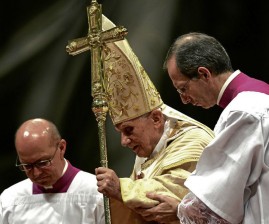
FILE PHOTO
VATICAN CITY—Pope Benedict XVI’s resignation on February 28 will leave his successor a formidable to-do list as the head of a Roman Catholic Church hit hard by sex abuse and money laundering scandals, internal bickering and growing secularism in Europe.
Here is a list of key issues facing the future pope:
- SEX ABUSE: After sordid revelations of child abuse by priests erupted in Europe and the United States, Benedict apologized for the Church’s role in turning a blind eye and protecting abusers, but campaigners say not enough has been done to bring suspects before the law. The revelations appear to be far from over: the latest case saw a Los Angeles bishop stripped of his office last month after being linked to an abuse cover-up.
- VATICAN MONEY LAUNDERING: Plagued by a dark history of murky financial dealings and accusations of mafia ties, the Vatican bank has promised to step up efforts against money laundering. Despite insisting it wants to make it on to the White List of financially virtuous states, moves to increase transparency have been plodding. The head of the bank was sacked in May last year — according to some because he was too zealous at sniffing out suspicious deals — and his successor has still not been named.
- HOMOSEXUALITY AND GAY MARRIAGE: This is one of the Vatican’s most critical issues. While condemning violence against homosexuals, Benedict has refused to be shaken on the Church’s teachings on the traditional family of father, mother and child, and intervened directly in recent heated debates in France and Britain on same-sex marriage. In December, Benedict said mankind was at stake, insisting that same-sex unions called into question what it means to be “true men”.
- CURIA, SECRETS AND INTRIGUE: Absorbed by his studies, the academic Benedict has failed to gain control of or reform the Curia, the Church’s secretive and powerful governing body. Dominated by Italian clerics, the curia is key to a papacy because it can intervene in unfavored papal decisions and uphold the status quo. Benedict was hit hard by the “Vatileaks scandal” last year, where memos leaked by his butler revealed infighting, intrigue and a power struggle at the heart of the Church. The challenge for the future pope will be to stamp his authority on the curia.
- ORDINATION OF WOMEN AND PRIEST CELIBACY: Calls from self-proclaimed disobedient priests and campaigners to end priest celibacy, and accept women into the clergy to fill positions left empty as priest numbers dwindle, were denounced by Benedict last year as self-serving. He insisted the Church does not have God’s authority to ordain women and said celibacy was central to the priesthood — but amid increasing calls for clergy to be allowed to marry and claims that abstention may have contributed to sex abuse scandals, the future pope may have to re-think the issue.
ABORTION: Benedict has insisted on the Vatican’s “duty” to defend “basic human values” by refusing to counter abortion or euthanasia, describing attempts to “select people and exclude others from humanity” as utterly immoral. In 2010 he appointed to a top Vatican job Canadian cardinal Marc Ouellet, who has said that abortion is a “moral crime” even in rape cases. Ouellet is among those tipped as a possible contender for the papacy. Roman Catholic teaching on scientific and medical procedures dealing with human reproduction are currently lagging behind biomedical and bioethical research on infertility in particular.